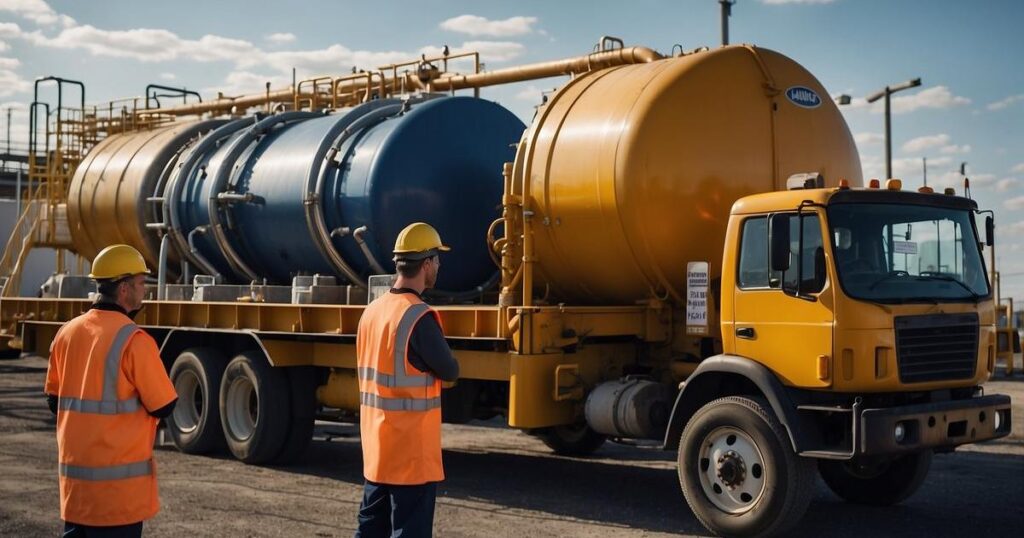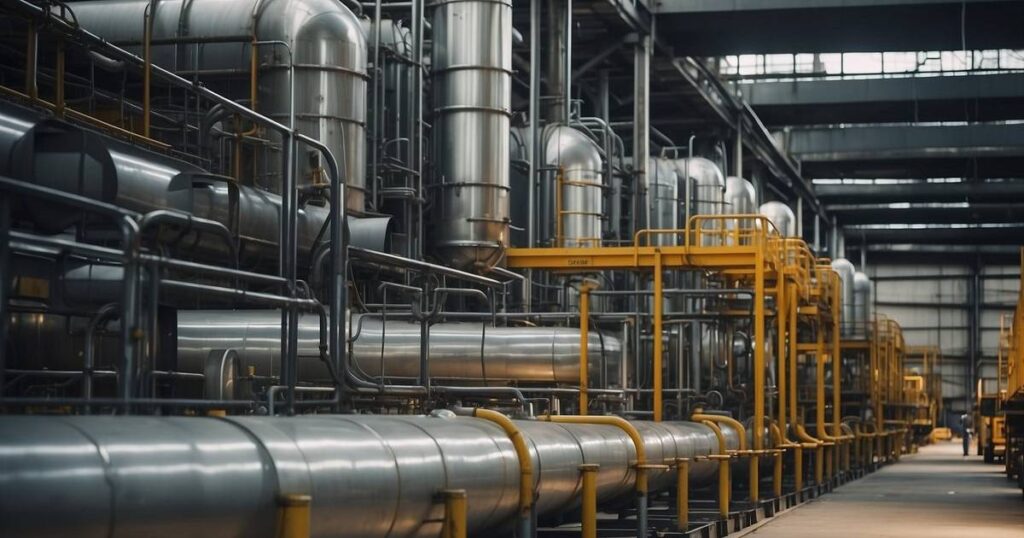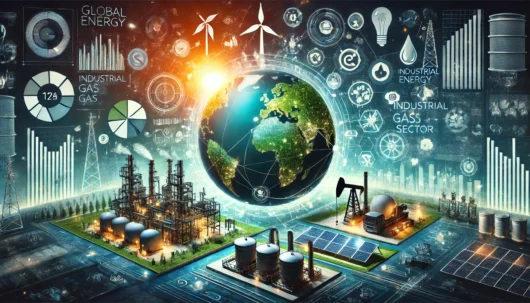Logistics play a pivotal role in ensuring a steady and reliable supply of energy resources in the dynamic world of oil and gas. The complexity of managing the supply chain from production to the final customer involves many steps, each with its own set of challenges. To keep up with the industry’s demand and mitigate potential disruptions, logistics teams must meticulously plan and execute every aspect of industrial gas supply, including transportation, storage, demand forecasting, and inventory management.
The logistics in the gas supply chain management are multifaceted and require a deep understanding of market trends, regulatory requirements, and technological advancements. Companies engaged in this sector often face numerous challenges, including volatile fuel prices, geopolitical influences, and the need for infrastructural development. However, leveraging strategic partnerships, investing in technology, and optimising operations can serve as solutions to overcome these obstacles and enhance supply chain resilience.
Key Takeaways
- Logistics is crucial for a stable industrial gas supply.
- The oil and gas supply chain faces unique challenges.
- Strategic solutions enhance logistics efficiency.
Logistics in Gas Supply Chain Management

In the realm of oil and gas, logistics plays a critical role in ensuring that the supply chain operates efficiently and effectively. Your understanding of the interplay between transportation, resilience, and innovation is essential in managing the complexities of the gas supply.
Optimising Transportation and Distribution
To maximise the reliability and cost-efficiency of gas supply, you should focus on route optimisation and transportation modalities. Pipelines remain the most prevalent method for transporting natural gas owing to their low transport costs and high capacity. Still, LNG tankers and trucking have become necessary where pipelines are not feasible. You must balance these options against speed, cost, and environmental considerations.
Upstream Supply Chain Operations
The upstream segment entails exploration and drilling, which is fundamental to your oil and gas supply chain. An optimal upstream operation manages materials and logistics costs from crude oil extraction to production. Here, logistics involves managing the shipment of drilling equipment, ensuring safety and compliance, and handling crude transportation.
Strengthening Supply Chain Resilience
Supply chain disruptions, such as those caused by a pandemic or geopolitical tensions, emphasise the importance of resilience in your logistics strategy. By adopting risk management practices and reviewing security measures, you can prepare for uncertainty. Building a resilient supply chain may involve diversifying suppliers and transport routes to ensure a steady supply.
Improving Supply Chain Efficiency
Efficiency in the gas supply chain translates to reduced operating costs and increased reliability. Implementing control towers for better visibility and outsourcing non-core logistics functions to third-party logistics (3PL) providers can achieve this. You can also explore integrating fourth-party logistics (4PL) for further optimisation.
Advancements in Technology and Infrastructure
Embracing the latest technology is key to streamlining your logistics operations. This includes utilising automation in warehouses, AI for predictive maintenance in oilfields, and IoT devices for real-time tracking of shipments. Advancements in infrastructure, like building state-of-the-art LNG terminals, can also significantly enhance your logistics capabilities.
Regulatory Compliance and Environmental Sustainability
You must comply with various oil and gas transport regulations to avoid legal repercussions and ensure safety. Furthermore, logistics operations should adopt sustainable practices to minimise their environmental impact. This includes investing in renewable energy sources for your transport fleet and using materials that minimise the environmental footprint.
Exploration of Strategic Collaborations
Exploring partnerships and collaborative ventures can lead to mutual benefits such as cost savings, improved capacity, and shared resources. Strategic alliances may involve upstream and downstream players in the gas supply chain, enabling you to harness the strengths of various partners for a more robust logistics network.
Market Dynamics and Energy Demand
Your logistics strategies must adapt to the volatile gas market, where oil prices and energy demand significantly influence transport costs and supply chain management. Anticipating inflationary pressures and crafting responsive logistics plans will aid you in maintaining a competitive presence in the market.
Dealing with Industry Challenges
Facing industry challenges head-on is crucial. Whether managing capital expenditures wisely or diversifying energy sources in light of renewable trends, addressing the root causes of logistical challenges will ensure you maintain a steady industrial gas supply amidst fluctuating conditions.
Adapting to New Energy Landscapes
Your logistics strategy must adapt as the energy landscape evolves with an increasing shift toward renewables like wind and solar. Prepare to transition smoothly by scaling up capacities, exploring renewable energy sources, and aligning logistics operations to accommodate new types of energy products.
Global Logistics and Regional Considerations
Given the international nature of the oil and gas industry, you must recognise the importance of global logistics. Regional regulations, political stability, and local demand are crucial when managing your global supply chain. Tailoring logistics approaches to fit North American, Asian, or European markets is key to global competence.
Downstream Logistics and Processing

Downstream logistics and processing play a pivotal role in the safe and efficient delivery of oil and gas products to the market. This includes refined product distribution and ensuring adherence to safety and quality standards, all while navigating the integration of renewables and adapting to consumer demands.
Refinement and Distribution Networks
You must know that refining and transporting oil and gas to end users encompasses a broad network of refineries and an intricate array of pipelines, trucks, and oil tankers. Refineries are critical infrastructures that transform crude oil into usable products. Distribution networks then strategically move these products to markets or storage facilities. To optimise these networks, supply chain solutions focus on maintaining transparency throughout the process, ensuring payment and transaction accuracy.
Ensuring Product Quality and Safety
Adhering to standards of quality and safety is paramount in downstream processing. Your strategies include strict monitoring of the refinement process and logistics operations, covering environmental impact and compliance with regulations. You can maintain product integrity and detect safety or quality irregularities using sensors and real-time tracking systems.
Consumer and Market Oriented Strategies
In your approach, consider market strategies prioritising customer satisfaction by promptly and accurately meeting demands. Demand forecasting tools enable responsiveness to market fluctuations and help anticipate consumer needs. As part of your energy logistics plan, remaining vigilant of supply and demand trends is crucial for aligning with the market pace.
Integration with Renewable Energy Markets
Incorporating renewable energy sources into the overall energy mix is becoming increasingly significant. You are tasked with creating synergies between traditional energy logistics and renewables, minimising environmental impact. Establishing infrastructure supporting fossil fuels and renewable energy markets is key for a sustainable transition.
In conclusion, your role in downstream logistics and processing is to ensure a seamless transition from refinery to market, maintaining quality, safety, and efficiency while integrating innovative strategies to meet the evolving energy landscape.
Frequently Asked Questions
This section addresses common inquiries regarding logistics in the industrial gas supply, highlighting the challenges, impacts, and strategies crucial for efficient logistics.
What are the various logistical challenges faced in the gas supply chain?
Your logistical operations can encounter multiple challenges, such as transportation mode selection, maintaining product integrity, managing costs, and handling regulatory requirements. These factors can significantly affect the safety and timeliness of gas deliveries.
What impact does logistics have on the overall efficiency of gas supply?
Logistics plays a pivotal role in your gas supply efficiency. Effective logistics can minimise transportation times, lower costs, ensure consistent supply, and satisfy customer demands through proficient transport, storage, and distribution coordination.
How do logistics strategies differ between the oil and gas industries?
While there are similarities, you’ll find logistics strategies in the gas industry often centre on maintaining the integrity of gas under varying pressure and temperatures. Oil transport also involves stringent safety protocols but with different handling as it’s often transported in liquid form.
What are the key components of a successful logistics operation in gas supply?
Key components for success in your gas logistics include timely and cost-effective transport, adherence to safety standards, precise demand forecasting, robust storage solutions, and real-time tracking for supply chain visibility.
In what ways do advancements in technology affect logistics in the gas industry?
Technological advancements play a critical role in enhancing your logistics operations. They can lead to improvements in route optimisation, tracking systems, demand forecasting, and the integrated management of logistics processes, contributing to overall efficiency.
What are the necessary qualifications for a career in oil and gas logistics?
A career in oil and gas logistics typically requires a background in supply chain management, logistics, or a related field and an understanding of industry-specific regulations, safety standards, and the technical aspects of industrial gas supply.


